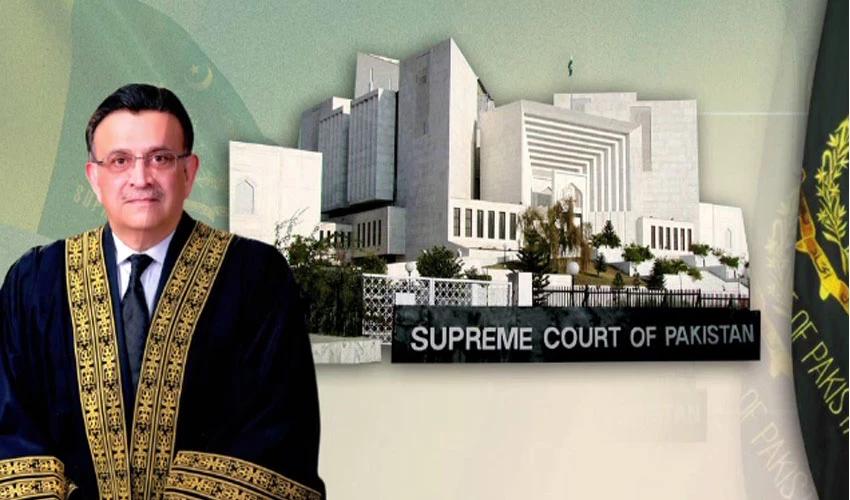The hearing of the case was adjourned till June 13.


Islamabad: Chief Justice of Pakistan (CJP) Umar Atta Bandial Wednesday said the implementation of May 14 verdict to conduct elections in 90 days is not possible, however this decision has become history.
According to details, a three-member bench headed by CJP comprising Justice Ijaz-ul-Ahsan and Justice Muneeb Akhtar is hearing the cases of petitions filed against the Supreme Court Review of Orders and Judgments Act and the Punjab Election Review case simultaneously in the Supreme Court.
The petitioners have appealed in the Supreme Court to declare the Review of Orders and Judgments Act invalid.
At the beginning of the hearing, Chief Justice of Pakistan said we have received some appeals regarding the issue of Review Act that has to be seen at a stage.
Attorney General has been notified, after the notice on the Review Act, the bench under the Election Case Act will hear the case.
Pakistan Tehreek-e-Insaf's (PTI) lawyer Barrister Ali Zafar said: “Supreme Court Review Act is against the Constitution, the same issue was raised in the Practice and Procedure Act”.
Supreme Court had placed a ban on the Practice and Procedure Act. The injunction of the Act also applies to the Review Act, he stated.
Ali Zafar added that Supreme Court can hear Punjab Election Revision case, however the Supreme Court Revive Act is not applicable to this Court because of the injunction.
The court can stay the decision on the Revision Act till the decision of the Review Act. Arguments in the election review case are almost over, now the case should be completed, said barrister.
Justice Muneeb Akhtar said: “If the Review Act is implemented, then the lawyer of Election Commission of Pakistan (ECP) will have to give arguments again in the larger bench”.
He stated how the court can hear the Punjab election case if Supreme Court Review Act has been implemented? Also tell us how the Supreme Court Review Act is not applicable in the Punjab election review case.
CJP Bandial added that everyone wants the decision of Punjab election review case, the lawyer of ECP argued that they have wider powers, appeals also have some limits.
He added that Punjab election review case is not new, it has been discussed earlier. The arguments of the Election Commission's counsel were on expanding the scope of the review, if the election review case goes to a larger bench, then ECP's counsel can start arguments from there.
Umar Atta Bandial said: “The court decision will remain in history that elections are mandatory in 90 days, it was to be seen whether 90 days can be extended for elections”.
He questioned if the conditions after the events of May 9 are as per listed in the constitution for postponement of elections? Everything is not possible by violence and force.
PTI’s Barrister Ali Zafar requested to decide the Punjab election review case, stating that whatever the circumstances or arguments are, the court should decide the Punjab election review case soon.
“On the night of May 15, I felt that the constitution had died. On the day, the fixed term of the elections and the decision of the Supreme Court were insulted,” said Barrister Ali.
He added: “Every day I feel that the constitution has been killed. Whatever arguments the Election Commission's lawyers give, it will not change the reality”.
Barrister Ali Zafar said that when the review act was passed, it was asked in the senate that how are you making laws that contradict the constitution? This review act was passed by the Senate in 5 minutes and there was no debate there.
The amendments in Article 184-3 are certainly good, but this is possible only through constitutional amendments. Laws related to the independence of the judiciary can only be made through constitutional amendments, said Ali.
Chief Justice asked whether you think the government has given the right to appeal in Article 184-3, which is against the constitution. Barrister Ali Zafar responded: “The points which were not raised in the main case cannot be brought up in revision”.
CJP Umar added that there are good amendments related to Article 184-3 in this law, the only mistake made was calling the revision of Article 184-3 as an appeal. We will ask the Attorney General Mansoor Usman Awan why the government made a mistake.
Attorney General replied that the petitioners against the Supreme Court Review Act are in their personal capacity, if Ali Zafar wants to be a party to the case, then file the petition.
Umar asked about some way to save time, stating that the good thing is government and the institutions have decided to follow the law.
“Today the government’s point is not based on mathematics but on the law and facts. We appreciate the good legislations of government, he added.
Bandial inquired the government was protesting at the gates, did the protest mean to obstruct justice? This duty of justice that we are doing is God’s work, to interfere in our work is to interfere with the truth.
Petitioner Zaman Khan Wardag and other petitioner Ghulam Mohiuddin adopted the arguments of Barrister Ali Zafar against the Supreme Court Review of Orders and Judgments Act.
The court issued notice to the parties in the Supreme Court Review of Orders and Judgments Act case.
Court says that the petitions came against the Supreme Court Review of Orders and Judgments Act. According to them, the act to extend the scope of review is illegal, constitutional amendment is necessary to expand the jurisdiction of review. A larger bench has already issued an injunction on the Practice and Procedure Act, fixing the two cases for hearing together on Tuesday.
It has also issued notices to the Attorney General, the party president, the federal government, the Ministry of Parliamentary Affairs in the Supreme Court Review of Orders and Judgments Act case.
The hearing of the case was adjourned till June 13.
The Chief Justice of Pakistan said possible the case will be heard on a daily basis from Tuesday, the Punjab elections case will also be scheduled along with the review case.
Notable earlier on May 29, a gazette notification was issued for the implementation of Supreme Court Review of Orders and Judgments Act, 2023.
Following the new law, revision appeals can be filed within 60 days of decisions under Section 184/3 and it will be heard by a larger bench than the decision-making bench. However, in the past, a review petition was heard by the same bench that passed the judgment.
The scope of revision petition will now be the same as that of an appeal as per new law.
Tragedy in Sri Lanka: Bus crash kills 21, injures 24 pilgrims
- 8 hours ago

Karachi braces for hot, humid day as temperature hits 36°C
- 8 hours ago

Pound-for-pound rankings: Inoue retains spot, Canelo falls after lackluster performance
- 7 hours ago
Zelensky urges Russia to commit to 30-day ceasefire, ready for direct talks
- 7 hours ago
Important press conference by DG ISPR, senior military officials today
- 7 hours ago

She was arrested for an op-ed. Now a judge has ordered her freed.
- 8 hours ago

Punjab schools to reopen tomorrow after ceasefire between Pakistan and India
- 8 hours ago

Washington and Beijing reopen trade dialogue
- 8 hours ago
Passenger bus catches fire near Kallar Kahar
- 8 hours ago

Two police officers martyred in Peshawar suicide blast
- 2 hours ago

Top prospects for the 2025 NHL draft: Updated rankings after U18s, draft lottery
- 7 hours ago
Former Australian cricketer Bob Cowper passes away at 84
- 9 hours ago






